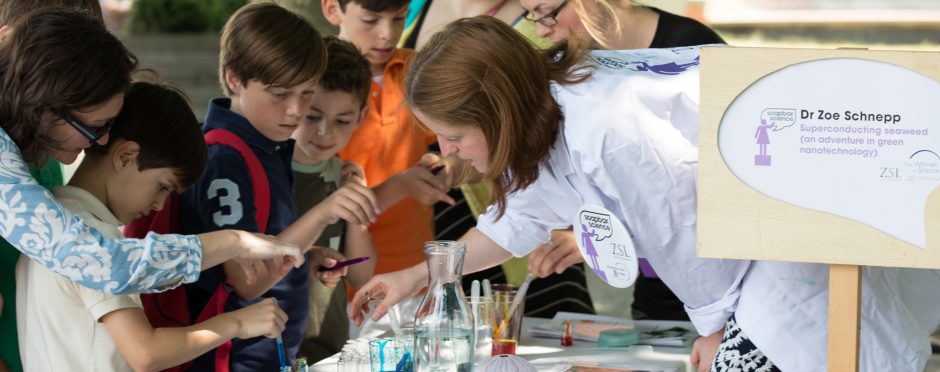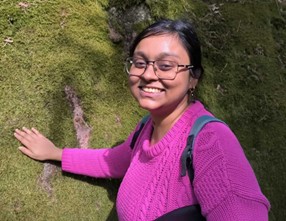Event details
Date: Saturday June 14th
Time: 10am-1pm
Location: Stockholm, Rålambshovspark in the amphitheatre.
Our Soapbox Science event 2025 will take place in Stockholm, Sweden. Built on 14 islands around one of Europe’s largest and best-preserved mediaeval city centres, the city is stunningly located by the Baltic Sea. Researchers will take to the streets to share their work and amaze passers-by with the latest cutting edge science.
Speakers
Gabriela Prando, PhD, RISE, “The Invisible Engines of Tomorrow: How Advanced Materials Will Revolutionize Semiconductors”
Biography: Gabriela is a researcher specializing in semiconductor materials and nanotechnology, with a focus on the optical and electrical properties of 2D materials and III-V semiconductors. Currently she is based at RISE, exploring new applications for semiconductor materials, including microfabrication of devices.
Ekaterina Torubarova, MSc, KTH, “Language Brain + Robots”
Biography: Ekaterina studies how our brain understands the meaning of words, especially in cases when the meaning does not reach our consciousness. She is a 3rd year PhD student at KTH studying how language in the brain works during everyday communication, i.e. how we know when, what, and how to say, and how we predict the same from others. She also studies this process when we talk not only to other people but to non-human agents such as social robots.
Juliana Francis, KTH, “Voice Blending and Creation”
Biography: Juliana is a PhD Student in the Speech, Music, and Hearing (TMH) department at KTH Royal Institute of Technology in Stockholm, Sweden. Her research interest is on building tools and technology to enhance communication of individuals, with a current focus on both methods for individuals to perform gender-affirming voice training, as well as improving the speed and naturalness of communication for individuals who use Augmented and Alternative Communication Devices. Juliana is also a current editor for the ISCA LGBTQI* webpage.
Ambika Kirkland, KTH, “Speech Synthesis”
Biography: Ambika’s background is in cognitive science, experimental phonetics and computational linguistics. She worked a lot with using EEG to study turn-taking in conversation before starting her PhD at KTH, where she investigates speech perception and speech synthesis.
Hsiang-Ju Fan, Stockholm University, “Why do we need to know soil? Soil health and food supply”
Biography: Hsiang-Fu is a soil scientist with a passion for improving agricultural systems. Her background focuses on plant nutrients and soil microbial communities, and she had valuable experience of working closely with farmers in rural areas of Southeast Asia. That experience highlighted for me the critical importance of making scientific knowledge more accessible and applicable to those who need it most. She is pursuing her PhD, developing fast and efficient methods to analyze soil properties, specifically through light reflectance technology.
Shadaab Ghani, KTH, “Debiasing LLMs: Strategies for Ethical and Trustworthy AI”
Biography: Shadaab is currently pursuing her PhD in Natural Language Processing (NLP) at KTH Royal Institute of Technology, where she focuses on advancing cutting-edge NLP research. Prior to this, she worked as a Machine Learning Engineer for three years, specializing in classical machine learning and NLP applications, gaining hands-on experience in developing scalable AI solutions. She has a passion for bridging research and real-world implementations. She is particularly interested in language models, interpretability, and multilingual NLP.
Andressa Mazur, KTH, “How we source critical materials from old batteries?”
Biography: Andressa is a 4th year PhD student in the Resource Recovery division of the Chemical Engineering department at KTH. Her PhD dissertation topic is the simultaneous crystallisation of critical raw materials from the lithium-ion battery recycling process. She graduated as a chemical engineer on the Technological Federal University of Paraná, Brasil, and received her masters from the Institute of Braganca, Portugal, where she worked on wastewater treatment for olive oil industry. Her research interests include novel crystallization techniques and approaches, microfluidics systems, urban mining, and waste streams treatment. She is passionate for equality and diversity in academia and runs the project PhD IMPACT together with other KTH members.
Gláucia Laís Salomão, Stockholm University, “Wired for Empathy: How We Hear, Feel, and Connect“
Biography: Glaucia is a voice and speech scientist interested in how we communicate emotions, attitudes, and personality traits through speech. Her background is in music and linguistics, and her research has primarily focused on voice acoustics and physiology in the communication of emotions. Recently, she received funding from the Swedish Riksbankens Jubileumsfond to investigate what happens in the brain when we express, perceive, or even imagine expressing or perceiving emotions conveyed through the voice. Her ultimate goal is to study voice and emotion from a neuroscientific perspective and to shed light on the neural mechanisms underlying empathy elicited by emotionally expressive voices.
Miriah Meyer, Linköping University, “What is data?”
Biography: Miriah is a professor in the Department of Science & Technology at Linköping University, supported through the WASP program. Her research focuses on the design of visualization systems for helping people make sense of data, and on the development of methods for helping visualization designers make sense of the world. She obtained her bachelors degree in astronomy and astrophysics at Penn State University, earned a PhD in computer science from the University of Utah, and completed a postdoctoral fellowship at Harvard University. Prior to joining the faculty at LiU she was an associate professor in the School of Computing at the University of Utah. Miriah has received numerous awards and recognitions for her work including being named a University of Utah Distinguished Alumni, both a TED Fellow and a PopTech Science Fellow, a Microsoft Research Faculty Fellow, and included on MIT Technology Review’s TR35 list of the top young innovators. She was also awarded an AAAS Mass Media Fellowship that landed her a stint as a science writer for the Chicago Tribune.
Sofia Bobadilla, KTH, “What are smart contracts and how they are modeling the world.”
Biography: Sofía Bobadilla is a PhD student at KTH Royal Institute of Technology, specializing in automated program repair for smart contracts. She holds a Civil Engineering degree from the University of Chile and has a background in developing automatic feedback systems for computer science education. Her current research focuses on enhancing the reliability of smart contracts and exploring advancements in blockchain technologies.






